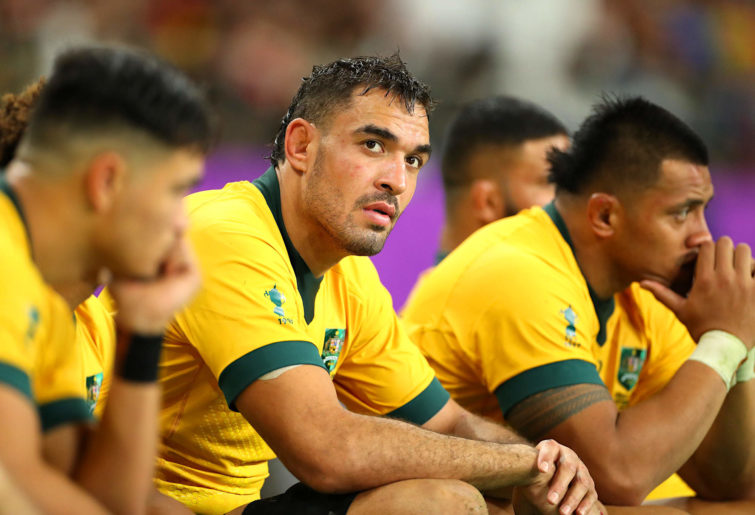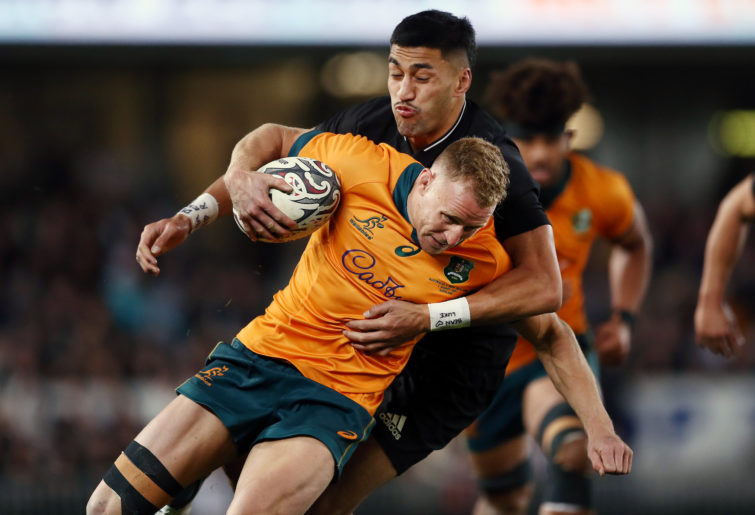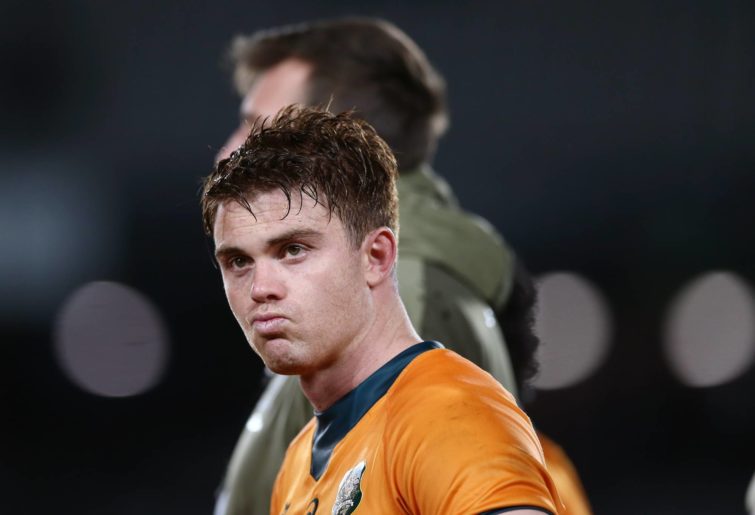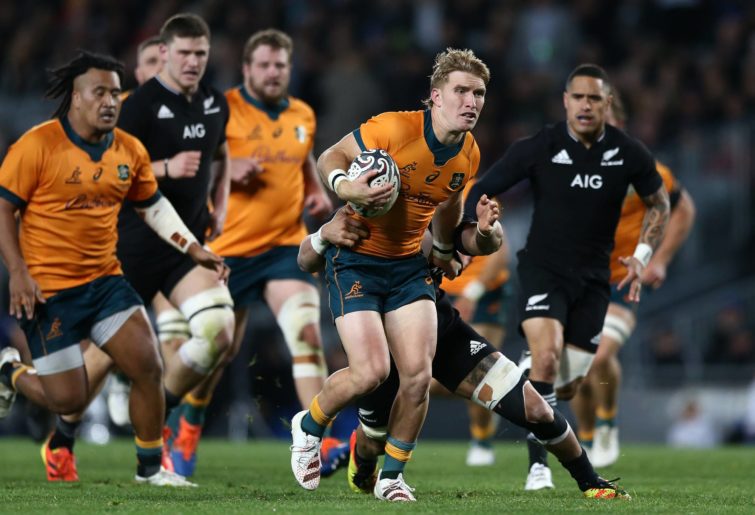Obviously, another Bledisloe thrashing is hard to swallow. So much gnashing of teeth and all sorts of panicked solutions are flying about.
Apparently, we must revoke Giteau’s Law and allow the selection of any overseas-based Australian player, no matter how many Tests they may have played.
While this sounds possibly good, overseas form is difficult to judge, and player combinations developed at Super Rugby level are a valuable part of the Wallabies’ performance.
Overseas-based selections seem to work for South Africa, but time-zone parity with Europe means that the French Top 14, Gallagher Premiership, and Guinness Pro14 are viewable at good times for SA audiences, so form assessment is a lot easier. Also travel to and from Europe is a lot faster, and South Africa has teams in the Pro14.
Another thing to consider is are there any players that might make a difference? Up until recently, Wallabies and Super Rugby players left towards the end of their careers, not expecting to press for Wallabies selection anymore.
Currently however, there are several possible forward selections that might beef up the pack – Adam Coleman, Rory Arnold, and Will Skelton as lock options, Tolu Latu at hooker, Sean McMahon at six, seven or eight perhaps.

Rory Arnold. (Photo by Dan Mullan/Getty Images)
In the backs, only Samu Kerevi at 12 or Kurtley Beale at fullback seem possibilities. But are these players going to fix the problems we saw last Saturday?
So, what were the main problems with the Wallabies’ performance, and were the All Blacks just too good?
Firstly, and we have seen this happen time and again, the All Blacks’ momentum comes from scoreboard pressure, and goes into overdrive against Wallabies errors, like a feeding frenzy of sharks, because they feel the freedom to just let it flow and play instinctively.
They train to play that way, so they can do it well. It is a ramp-up from their preceding play, so opponents need to be aware and ready for that. Too often, the Wallabies seem surprised when the ramp-up occurs.
If the scoreboard is tight or against them, the All Blacks play very differently.
There is no rocket science in knowing that scoreboard pressure is the key, or that winning the key moments is the foundation of winning the match.
But the Wallabies often appear, once again, to be taken by surprise when certain events occur, leading to an All Blacks score, which then has a flow-on effect of lowering their performance level and allowing fairly easy further scoring and then the ramp-up as the killer blow.
The All Blacks have used sport psychologist assistance for some time, and it does seem to play a strong part. Does the Wallabies’ infrastructure match that attention to detail?
Some Wallabies errors appear to be simply bone-headed, such as three simple intercept tries to the All Blacks in two matches. Obviously, the All Blacks have trained for these intercepts when playing the Wallabies in this series, and All Blacks outside centre Rieko Ioane said they were reading their plays like a book.

(Photo by Anthony Au-Yeung/Getty Images)
So here we have inexperience as a possible cause, with inadequate coaching as a second possibility, or maybe we have both occurring at the same time. Both is more likely, given the way these events unfolded.
An interesting point here, however, is that if the Wallabies are fully prepped on what to expect, they could use that to their advantage instead.
Any player who is primed and ready to execute an intercept is primed and ready to be cut-out by a dummy, double-pump, chip over or through, or a hard run to bend the gain line. The miracle ball over the top only works very occasionally anyway, but threatening to use it is a great way to keep the outside defence off-balance.
Going wide without sufficient progress up the guts beforehand is a recurring theme for the Wallabies. We have seen that the Wallabies have the ability to do that, and Tate McDermott’s running threat combined with forward running options can cause havoc.
Continuing the direct approach more often and for more phases is likely to disorient the defence much more effectively than a premature play to the widths.
And when the wide-play option is invoked too soon, the Wallabies’ ball-players and ball-runners need to be aware enough to change their strategy instead of doubling down and going for the high-risk play. Against good teams, high risk is generally too high.
There were two key moments for the Wallabies in the match.
Firstly, with the Wallabies on attack about 40 metres out, Lachie Swinton was running a Harry Wilson line back inside and dropped a Tate McDermott pass. Turnover.
The All Blacks’ strength is on turnover, but in defence the Wallabies had three front-rowers plus Rob Valetini with Andrew Kellaway on the wing.
Valetini showed inexperience, made a poor decision and cut himself out of the defence options, leaving Kellaway on the wing preventing Sevu Reece getting the pass. But where were the rest of the Wallabies’ backs?

(Photo by Getty Images)
Except for Tom Banks at fullback, and Kellaway, they were all over the left-hand side of the field and didn’t twig to the potential problem fast enough. That is not good enough.
As soon as the turnover occurred, it should have occurred to them that if they didn’t get there fast, then a try for the All Blacks was very likely. But they should not have all been too far away in the first place. Too many eggs in the one basket.
The try came down the middle, scored by the All Blacks’ lock Brodie Retallick, since Reece was blocked by Kellaway, but the Wallabies’ forwards and backs were not there in numbers to stop it. So a promising attack for the Wallabies resulted in a try at the other end. A cruel blow to the Wallabies.
Secondly, the Sevu Reece intercept try early in the second half, which was almost identical to the Rieko Ioane intercept try in the first half.
The Wallabies hadn’t managed to learn from their hard lesson in the first half – no thinking on the run there. Do the players have to wait for the coaches to tell them back at training for the next match?
Once again, inexperience or inadequate coaching, or both? Probably both, but this one smells more of inexperience and players’ mental attitude.
These two moments broke the Wallabies, and then the ramp-up.
Raising the issue of mental preparedness and sports psychologists throws important light onto the mental aspects of athletic performance. Confidence and the ability to perform under pressure are both inherent and learned traits.
In other words, performance can be improved by learned behaviour. Some players have more confidence than others, and for the Wallabies, Tate McDermott is showing how that plays out on the field.
That level of confidence can be inspiring to others, and it means more readiness to perform individually to benefit the team collectively. A reduction on the play-by-numbers, formulaic approach is desperately needed by Wallabies players, particularly, but definitely not exclusively, by the backs.

(Photo by Getty Images)
In reality, these games are won by fine margins of performance. Improvement in small things, attention to detail and not leaving anything to chance are the hallmarks of resulting precision and the confidence to perform that comes with that.
From that flows an 80-minute team performance that can then take advantage of the opportunities as they present themselves and so apply scoreboard pressure.
The Wallabies are not suddenly a bad team with poor players, but a team that must individually step up to ensure that they each put in an 80-minute performance, maintain their focus and attention to detail, and recognise that the risk/reward trade-off works both ways, for the attack and the defence. High risk is best avoided.
Finally, match preparation nowadays seems to include the trotting out of one or more players for media comments, probably for match promotional reasons.
Before the last match, Andrew Kellaway, who had scored a try and played well in the first Bledisloe Test, was wheeled out, probably for those reasons.
Unfortunately, the newbie Test player showed a lack of respect for his opponents in a manner that really pointed to the opposite meaning of his words.
Those words told me, as the reader, that the Wallabies thought the All Blacks had an aura of invincibility, but, really folks, not anymore because I just waltzed through them for an easy try. As if, unfortunately.
This sort of commentary is raw meat to the All Blacks as motivation and is totally counterproductive for the Wallabies.
I thought that way immediately as I read those comments before the match, and had a foreboding of what eventually did occur in the result, and even to the manner of the generation of the result (even though I didn’t really want to believe that and destroy my hopes for the match).
Teddy Roosevelt said “speak softly and carry a big stick”, a proverb that hasn’t endured for 100 years as sensible advice for nothing.
































































































